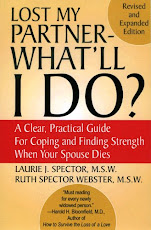 With the recent, widely publicized death of actor Robin Williams this week, those of you who have lost a partner to suicide may be reminded of the pain and confusion that followed your own loss.
With the recent, widely publicized death of actor Robin Williams this week, those of you who have lost a partner to suicide may be reminded of the pain and confusion that followed your own loss.To help you gain some insight as well as develop coping strategies, we're posting this excerpt from our book, Lost My Partner - What'll I Do?
As always, we look forward to hearing from you.
Understanding Suicide
You as the survivor:
“She seemed okay. Why didn’t she tell me she was feeling so depressed?”
“He often said life wasn’t worthwhile, but I didn’t think he’d ever kill himself.”
The aftermath of suicide can be especially difficult to cope with because it can leave you, as a survivor, feeling:
- Confused, guilty and self-blaming about why this act was committed or that you may have been responsible.
- Believing that you weren’t valuable and/or powerful enough to prevent someone choosing to die.
- Concerned about your clergyperson’s reaction, as some religions regard suicide as a sin.
- Worried about what to tell your child/children about the circumstances.
Expect your mourning process to take somewhat longer, because of the added burden of all of the above.
How to relieve yourself and your family of some guilt:
1) Your spouse/partner exercised a choice and ultimately was the only one to have the power to act on that choice. If there was anger at you or anyone else, there were more effective ways he/she could have chosen to communicate feelings.
2) You are not to blame for something as complex as another person’s act of suicide. A multitude of factors, such as personality, self-esteem, family history, and the ability to deal with life’s stresses all contributed to your partner’s behavior.
3) You may be turning the anger you feel about your spouse/partner’s abandonment inward onto yourself. This can take the form of guilt and self-blame at being helpless to stop a suicide. It is not disloyal to be angry at people we love when their actions cause us pain.
4) A suicide note reflects only what your spouse/partner happened to be feeling at the time it was written. Try not to view it as a generalization about your entire past relationship.
Additional important points to consider:
1) Children tend to blame themselves when a parent dies, even though they may not express it openly or be aware of it themselves. Recognizing this can be difficult, because, unlike most adults, children show they’re upset by their behavior, rather than by talking. A child may especially prone to self-blame, in the case of suicide. Children need to be given simple, truthful explanations of what has happened. It’s best to tell them how it happened, or they will fantasize about all sorts of frightening possibilities. Consider having your child/children work with a mental health professional to deal with this trauma.
2) Because it’s common for family members to blame the surviving spouse for either causing or not preventing the suicide, it’s helpful to talk about your feelings with supportive people outside your family. Join a specialized support group, if there is one available. The American Association of Suicidology (suicidology.org), provides information to survivors about support groups, books and specialists. Also check out Survivors of Suicide Loss (soslsd.org) for support options.
IMPORTANT REMINDER: If you or someone you know is seriously thinking about taking his/her own life, tell someone immediately! Call the Operator to reach your local suicide hotline and/or go to suicidepreventionlifeline.org to talk to a trained telephone counselor 24/7.




